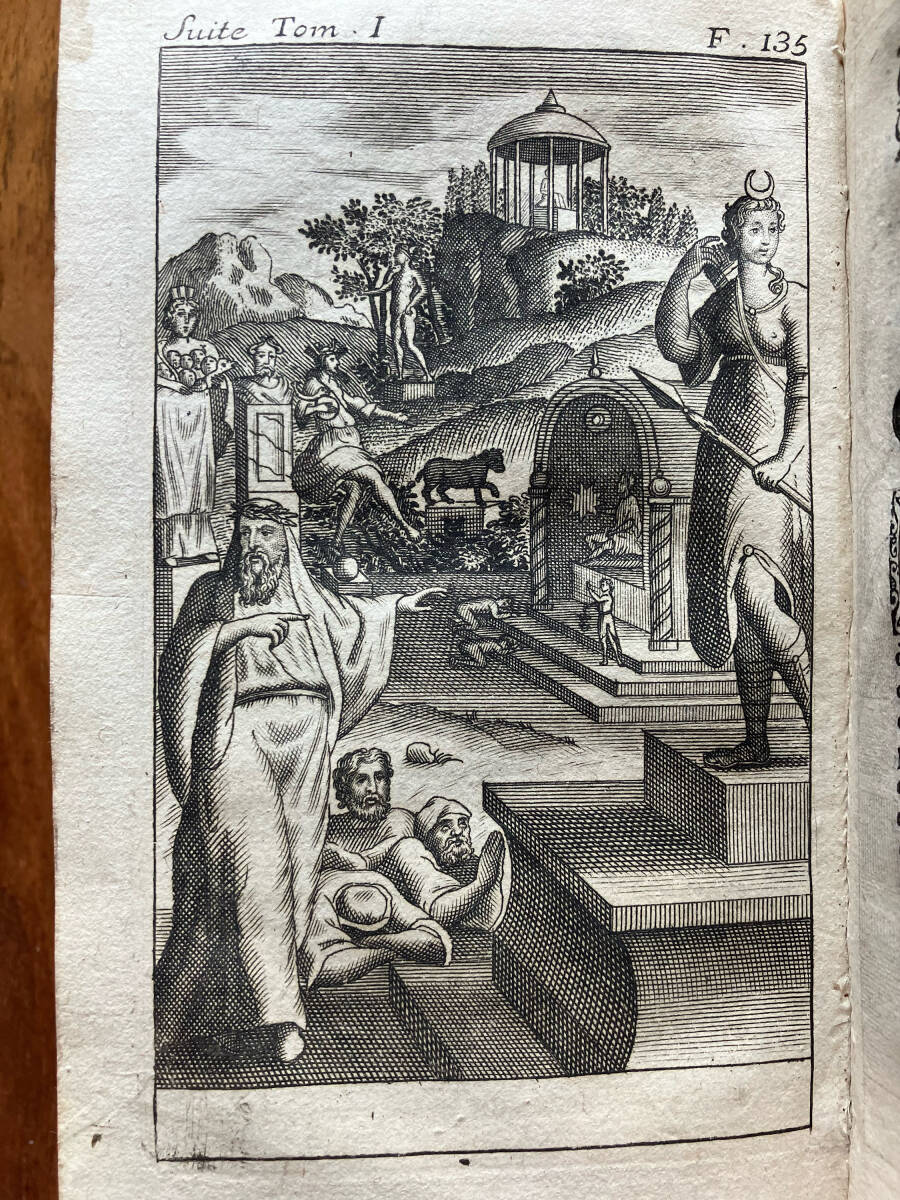









収録されている作品は、
Les Nouveaux Dialogues des Morts. Le Jugement de Pluton, sur les Deux Parties des Dialogues des Morts
(死者との新対話、死者との対話の二部分についてのプルトンの判断)
Les Entretiens sur la Pluralite des Mondes
(世界の複数性についての対話)
L'Histoire des Oracles
(神託の歴史)
の三篇です。
出品の書物は、外装(18世紀の総山羊革装)に難がありますが、中のテクストと図版(ヤブレあり)は経年良好の状態です。
特に貴重なのは、『世界の複数性についての対話』に折り込まれた銅版画の宇宙図で、画像5〜8でご覧いただけるように、
宇宙の中心が太陽(Soleil)ではなく水星(Mercure)になっています。1829年に出版された『世界の複数性についての対話』の宇宙図を確認すると、中心が太陽になっているので、18世紀から19世紀にかけての天文学の進展が裏付けられて、たいへん興味深いところです。
以下、ご参考までに、『世界の複数性についての対話』についての古書店(Currey, L.W. Inc. ABAA/ILAB)の解説を掲げておきます。
「第 2 版、増補版。この版には以前のテキストに対するいくつかの修正が含まれており、6 番目の対話が追加されている。フォントネルの最も有名で頻繁に再版および翻訳されている本「世界の多数性についての対話」は、1686 年に初めて出版された。この非常に重要な半ユートピア的宇宙分析は、「フランス語で学術的な著作を、教育を受けているが専門家ではない一般大衆の手の届く範囲に置いた最初の例」である。 - DSB、V、59。プトレマイオス、コペルニクス、ティコ・ブラーエの体系を対話形式で解説したこの論文は、「天文学への一般の関心を呼び起こし、科学的探究体系を普及させた。また、宇宙の残りの部分と比較して、人間とこの惑星が占める空間が小さいことを強調した。この作品は、ヴォルテールに嘲笑されたが、彼のミクロメガを示唆していた。」 - オックスフォード・フランス文学要覧 (1959)、p. 278。フォントネルの本は「初期の SF に重要な影響を与えた。これは、科学、特に天文学を素人に普及させた最も初期の作品の 1 つであり、その普及は、著者と侯爵夫人との夕食後の会話の形で、その推測 (多くは他の惑星での生命の可能性について) を機知に富んだ形で提示することによって実現されている。」 - クルートとニコルズ (編)、SF 百科事典 (1993)、p. 437. 本書の概要については、Ley 著『ロケット、ミサイル、宇宙旅行』(1951 年)22-4 ページおよび Ley 著『ロケット、ミサイル、宇宙人』(1968 年)21-2 ページを参照。Bleiler 著『サイエンス フィクション: 初期』853 ページ。Howgego 著『探検百科事典: 旅行の創作と外典』F16。Negley 著『ユートピア文学: 書誌』368 ページ(この版は CtY のみ)。Versins 著『ユートピア、異次元の旅、サイエンス フィクション百科事典』341-342 ページ。」
"Second edition, expanded. This edition includes several amendments to the earlier text and adds a sixth dialogue. Fontenelle's ENTRETIENS SUR LA PLURALITE DES MONDES, his most famous and frequently reprinted and translated book, was first published in 1686. This very important semi-utopian analysis of the universe is "the first example in French of a learned work placed within the reach of an educated but non specialized public." - DSB, V, 59. A popular account of the systems of Ptolemy, Copernicus, and Tycho Brahe in dialogue form, the treatise "awakened general interest in astronomy and popularized the scientific system of inquiry; it also emphasized the small space occupied by man and this planet relatively to the rest of the universe. The work was ridiculed by Voltaire, though it suggested his MICROMEGAS." - The Oxford Companion to French Literature (1959), p. 278. Fontenelle's book "became a seminal influence on proto science fiction . This is one of the earliest works ever written popularizing science, notably astronomy, for the layman, which it does by wittily presenting its speculations -- many about the possibility of life on other worlds -- in the form of conversations after dinner between the author and a marquise." - Clute and Nicholls (eds), The Encyclopedia of Science Fiction (1993), p. 437. See Ley, Rockets, Missiles, and Space Travel (1951), pp. 22-4 and Ley, Rockets, Missiles, and Men in Space (1968), pp. 21-2 for a good summary of the book. Bleiler, Science-Fiction: The Early Years, p. 853. Howgego, Encyclopedia of Exploration: Invented and Apocryphal Narratives of Travel F16. Negley, Utopian Literature: A Bibliography 368 (this edition CtY only). Versins, Encyclopdie de l'Utopie, des Voyages Extraordinaires, et de la Science Fiction, pp. 341-42."









 収録されている作品は、
収録されている作品は、